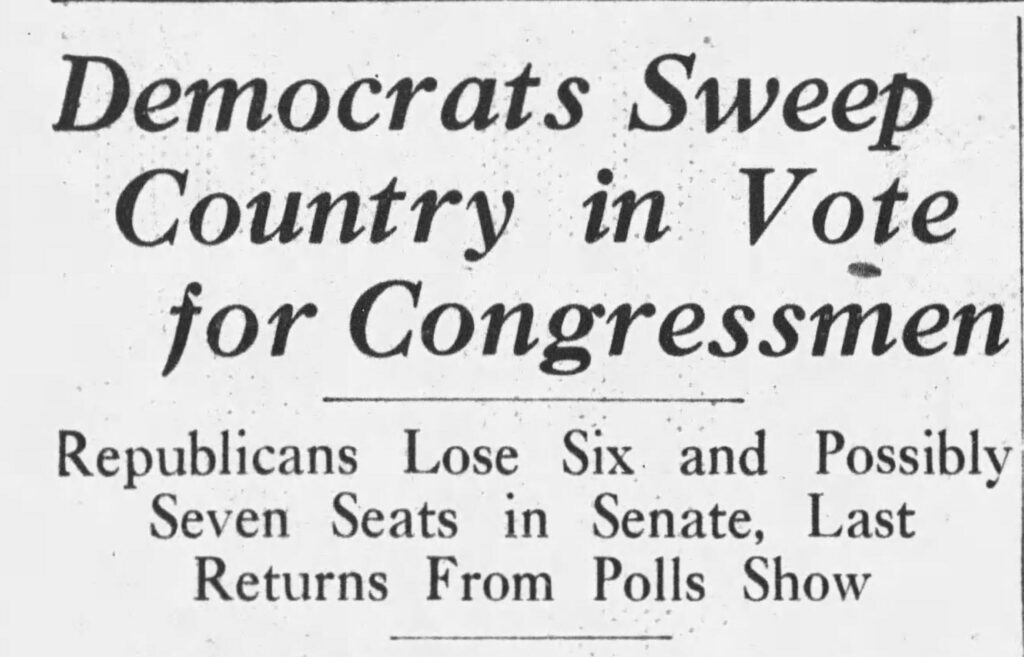Republicans are heading into the mid-term elections in November wielding two broad swords that they hope will whack them back into control of Congress.
The first weapon is a standard issue version of the political logic that the party in control of the White House almost always loses congressional seats in a mid-term election. Only twice in modern political history has this logic failed – 1934 during the presidency of Franklin Roosevelt and 2002 when George W. Bush was in the White House. Since the partisan margins are currently so close a betting person would put money on the GOP picking up seats.

The other thing going for the party out of power is their skillful exploitation of your anger, your grievance over, well, you name it. Don’t like a little inflation? Blame the president. Gas prices too high? It’s not Putin, but Biden. Tired of a pandemic that has killed a million Americans? Fauci works for the administration, lock him up! (Spoiler: he worked for the last one, too.)
Grievance is really the conservative’s biggest weapons. They’ve been perfecting it as a political tool longer than most of us have been able to vote. Who lost China? Harry Truman, George Marshall and the squishy Democrats, that’s who. Joe McCarthy made a career of exploiting grievance. Sunny Ronald Reagan did, as well.
Reagan seized a one-off story of a “welfare queen” – Black, of course – who he alleged exemplified what was wrong with the country. Welfare. Those in his audiences were upset with too much inflation, too much federal spending or too much government, but that stuff is hard to personify. A Black woman in a Cadillac, now that was a symbol.
There was, of course, a kernel of truth to Reagan’s single example, but it was the grievance he was really after. You should be upset, mad even that your tax money, well, all of us can finish the sentence. There ought to be a law!
Don’t like the fact that this multi-ethnic, multi-religious nation where white folks have long dominated politics, the economy and popular culture, while controlling most of the wealth is changing? Blame Black Lives Matter. What’s their beef, after all?
Upset that our long national struggle come to grips with the original sin of slavery makes some of us uncomfortable? Angry when a person of color points out that racism is literally baked into everything from zoning laws to college admission polices? Blame Critical Race Theory, whatever that is. Talking about the sin is, after all, more egregious than trying to understand it.
Wonder why thousands of migrants put themselves in harm’s way, facing injury and even death to get to the United States? To hear conservative members of Congress – or a former president – tell it they are scum of the earth. It’s easy to ignore that the vast majority are fleeing a life of poverty or persecution in hopes of a better life for themselves and their children. Having a mad on about these people just feels more natural than trying to understand what is actually going on.
Few modern-day Republicans acknowledge, or even know, the origins of their politics of grievance, but they own a debt to the master of political anger, Richard Nixon. As Garry Wills wrote of the brooding, insecure loner, “Every campaign had taught Nixon the same lesson: mobilize resentment against those in power.” That strategy has worked for Republicans for a long, long time, and may very well work again this year.
Democrats certainly have given their opponents openings, and they seem institutionally unable to talk about how their very real accomplishments, arrived at with no support from conservatives by the way, have helped the country. An historic infrastructure program is barely understood by most voters. Leadership of the remarkable international coalition defending democracy in eastern Europe is little acknowledged by Americans angry about the price of milk. Still, it’s past time to call out the grievance and the growing hate.
Listening to major Republican figures will give you a strong sense that Disney, your local library, the young woman who teaches second graders at the neighborhood elementary school, public health workers and immigrants, of course, are the real problems in America.
By the way, if you really believe librarians – and libraries are a big problem – it’s you that has the problem.
The so called “culture wars” cooked up on the radical right and pumped into the national bloodstream by the likes of Tucker Carlson, Marjorie Taylor Greene and a grifting former real estate developer are nothing more than the hog fuel of grievance. These merchants of hate are playing you.

The attacks on the LGBTQ community, on health professionals, on non-existent “groomers” of children are beyond reprehensible. And it must be confronted, which is exactly what a young, white, Christian, mother – and Michigan state senator did recently. Senator Mallory McMorrow was accused by a Republican colleague – the colleague was fundraising of course – of desiring to “groom and sexualize kindergarteners or that 8-year-olds.” A hideous and heinous allegation that McMorrow refused to let pass.
In a passionate statement that made national headlines, McMorrow did what more Democrats should try. She got mad and called this nonsense precisely what it is – hateful and harmful.
“I know that hate will only win if people like me stand by and let it happen,” McMorrow said. “So I want to be very clear right now, call me whatever you want; I hope you brought in a few dollars; I hope it made you sleep good last night. I know who I am. I know what faith and service means and what it calls for in this moment. We will not let hate win.”
This big, sprawling, diverse nation with its serious problems of racism, growing income inequality and for many lack of access to health care and decent housing is hard enough to keep together without one political party constantly throwing more logs on the cultural war bonfire.
Sure, debate real policies. Argue over how to improve education or solve homelessness. But check the hate. Put away the grievance. Go visit a librarian or try to understand the life of a public school teacher. They aren’t the enemy.
By the way, I met a young fellow recently who is an immigrant from Lebanon. He appeared to be a jack of all trades having worked for TSA, done construction, repaired cars and been a salesman. He was joyous, smart and engaging. An immigrant. I asked him why he had worked so hard for so many years, eight years he said, to come to America. A better life was his answer.
That’s the country I love. Let’s try to live up to it.
—–0—–
Additional Reading:
Some other items you may find of interest …
Republicans could rue the Supreme Court ending abortion rights

My good friend Rob Saldin, a political scientist at the University of Montana, and I co-authored a piece for the Washington Post this week on the politics of abortion.
“If the court overturns its line of decisions protecting abortion rights in Dobbs v. Jackson Women’s Health Organization, it will leave a very different set of Americans aggrieved. Supporters of abortion rights will fume over something long taken for granted being suddenly stripped away. And a fight in deeply conservative Idaho three decades ago indicates that their anger could scramble the politics of abortion.”
Remembering a landmark election more than three decades ago.
Laying siege to Idaho education isn’t a home-grown war. It is imported by conflict entrepreneurs
Idaho is just one of many states where anti-public school forces are trying not just to change public education, but destroy it. I linked to this piece above, but want to highlight it since I believe it’s that important.
“To fully comprehend this attack on education in Idaho one must first realize this is not a home-grown war, but one that has been imported into our state by wealthy and influential out-of-state interest groups whose goal is to first destroy the credibility of public education and ultimately weaken and privatize our local schools and higher education institutions.”
The author is Rod Gramer, an old and dear friend, who is fighting the good fight against the forces on the far, far right who would destroy public education. Here’s the link to Rod’s full piece.
The last phone boxes: broken glass, cider cans and – amazingly – a dial tone
From The Guardian, a deep dive into the British phone box.

“At the end of my wayward quest, I decided that if I couldn’t see someone make a call from a phone box, I could at least hear one ring. They must have rung so often, once. All those queues; a time slot long arranged for a parent to call a child who’d moved to the city; lovers waiting to hear each other’s voices. I texted my mother. Call me on this number! I’m in a phone box!
“She didn’t reply, probably busy. I waited for 10 minutes until the awkwardness of standing in a phone box doing nothing became overwhelming. I texted her again and told her not to worry – the combination of technology and communication once again proving itself to be an imperfect work in progress. To scratch the itch, I ended up ringing the phone box from my mobile, and there it was, the tinny little sound of potential connection, drifting into the street.”
Mimi Reinhard obituary
“Mimi Reinhard, who has died aged 107, was a prisoner at the Płaszów Nazi labour camp in a suburb of Kraków in Poland when in 1944 she was asked to help out with the preparation of a document for the camp commander Amon Göth.
“It was a list of people in the camp who would be sent to work in a munitions factory owned by an industrialist called Oskar Schindler, where they would be housed in barracks, away from the extreme cruelty of the camp. The record that Reinhard helped to compile, and typed up, later became known as Schindler’s list.”
Quite the life. Read her obituary.
The Night Kennedy and Nixon Were Bunkmates
When Jack and Dick went to McKeesport.

“Seventy-five years ago this month, before they were political rivals, they were political arrivals who developed a respectful, even amicable working relationship at a time when societal and partisan divisions were raw and deep. Their first debate, 13 years before their legendary televised duels, is a fleeting and little-known chapter of American political history. It is also a reminder of a time when members of opposite parties, without teams of handlers and policy aides to run interference or shape their message, could disagree vehemently about major issues and yet still place the need to inform and persuade the public above their own political differences.”
Read this good political history and then realize this likely could not happen today.
Thanks for spending some time here. Be well.
